Spring is a time of transition - birds find their way back to Iowa, farmers find their way back into their fields to plant a new crop, and legislators find their way back home. The legislators' per diem expense money ended on April 19. Hopefully that sign of spring means that the legislature will adjourn soon. The House began passing appropriations bills in late March. Those bills are now languishing in the Senate, waiting for the Senators to come to an agreement on what state government functions and initiatives they are willing to fund. Once the legislature adjourns, our attention will turn to the political campaigns, discussion of future legislative action and policy.
In the meantime, I hope you get to spend some time outdoors - looking at spring flowers, searching for morel mushrooms, watching the birds that have returned to Iowa.
Take care,
Pam Mackey Taylor, Chapter Director and Newsletter Editor
What you can do to help the environment
- Ask your legislators to keep the bottle deposit law working for all Iowans - continue the 10-minute convenience standard that says that a redemption center must be 10 minutes or less from a store, increase the handling fee paid to redemption centers, allow enforcement of the bottle deposit law if stores refuse to take empty bottles and no redemption center is close by.
- Donate to the Iowa Chapter of the Sierra Club so that we can continue this work.
- Ask Governor Reynolds:
- to sign the bill for radon testing in public schools and to undertake remediation if high levels of radon are detected - HF2412.
- to sign SF2322 - ensuring that copies of public records are to be at no cost or reasonably priced.
In this issue of the Iowa Sierran
Climate, Pipelines
-
And now there are 3 carbon dioxide pipelines
-
Iowa Beyond Coal Joins Effort to Clean Up MidAm
Water Quality
-
UPDATE – PFAS contamination closes Central City well
News from the Legislature
-
Legislation waiting for the governor's review
-
Ask legislators to keep the bottle deposit law working for all Iowans
Events
-
Join us for interesting and informative webinars and Lunch and Learns
Plus
-
Contribute to the Iowa Chapter
-
Volunteer for the Iowa Chapter
-
Calendar of events
-
To see the archive of previous Iowa Chapter newsletters
-
To see the White Pine Needle newsletter
And now there are 3 carbon dioxide pipelines
Details emerged this month about the third carbon dioxide proposed for Iowa. The proposal is for Archer Daniels Midland Company (ADM) and Wolf Carbon Solutions to build a 300-mile pipeline extending from Cedar Rapids to a sequestration site in Decatur, Illinois. The pipeline would carry pressurized liquid carbon dioxide from ADM’s ethanol plants in Cedar Rapids and Clinton. At this point, Linn, Johnson, Cedar, Scott, and Clinton counties are along the pipeline route, although the actual layout of the route has not been established.
Pressurized carbon dioxide is incredibly dangerous. A pipeline leak or break could poison, and even asphyxiate, surrounding communities and first responders, pets, livestock, and wildlife.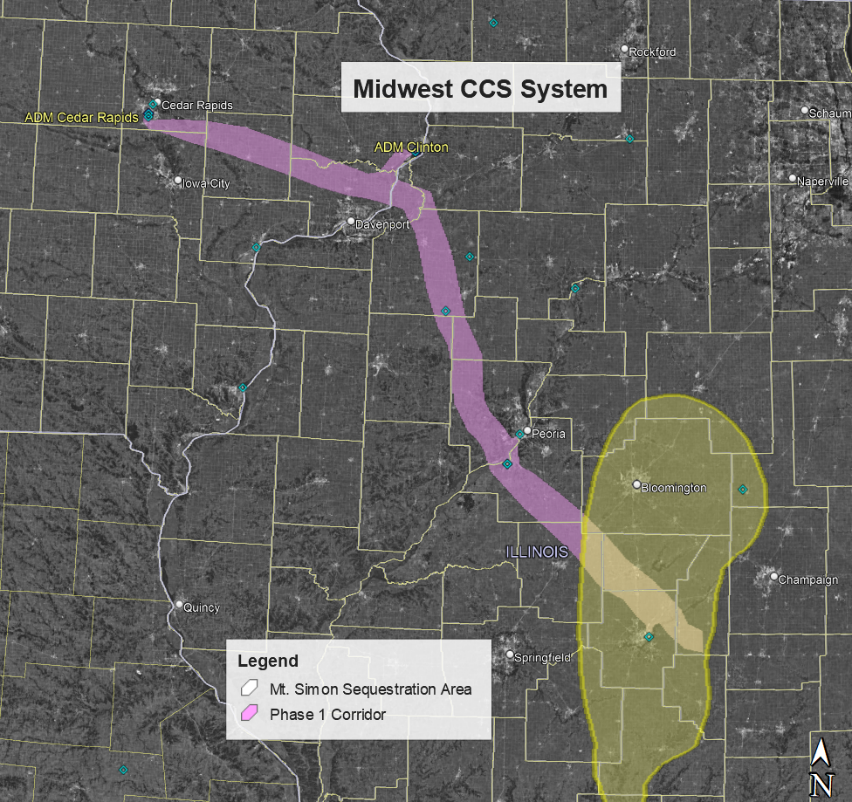
The Wolf/ADM pipeline joins two other pipeline projects that are slated to run across the state – Navigator Heartland Greenway and Summit Carbon Solutions. Read more about these carbon dioxide pipelines
Like other pipelines, it is likely that Wolf/ADM will be asking the Iowa Utilities Board to grant them eminent domain authority, which will allow them to seize an easement from a landowner.
We already know the solutions to our climate crisis - we must end our dependence on fossil fuels and invest in solar, wind, battery storage, conservation and efficiency! CCS continues business as usual and delays investment in REAL climate solutions.
- The carbon dioxide pipelines in Iowa are being offered as false climate solutions, especially if they will be utilized for enhanced oil recovery and extending the life of the ethanol industry.
- The pipelines will extend the life of polluting ethanol industry and industrial agriculture practices that have contributed to our climate crisis, water pollution, and more.
- These pipeline projects do not address other emissions or forms of pollution from fossil fuel extraction and industrial agriculture.
Further, these pipelines will only be feasible with massive public subsidies called 45Q federal tax credits.
We want real climate solutions - not greenwashing schemes!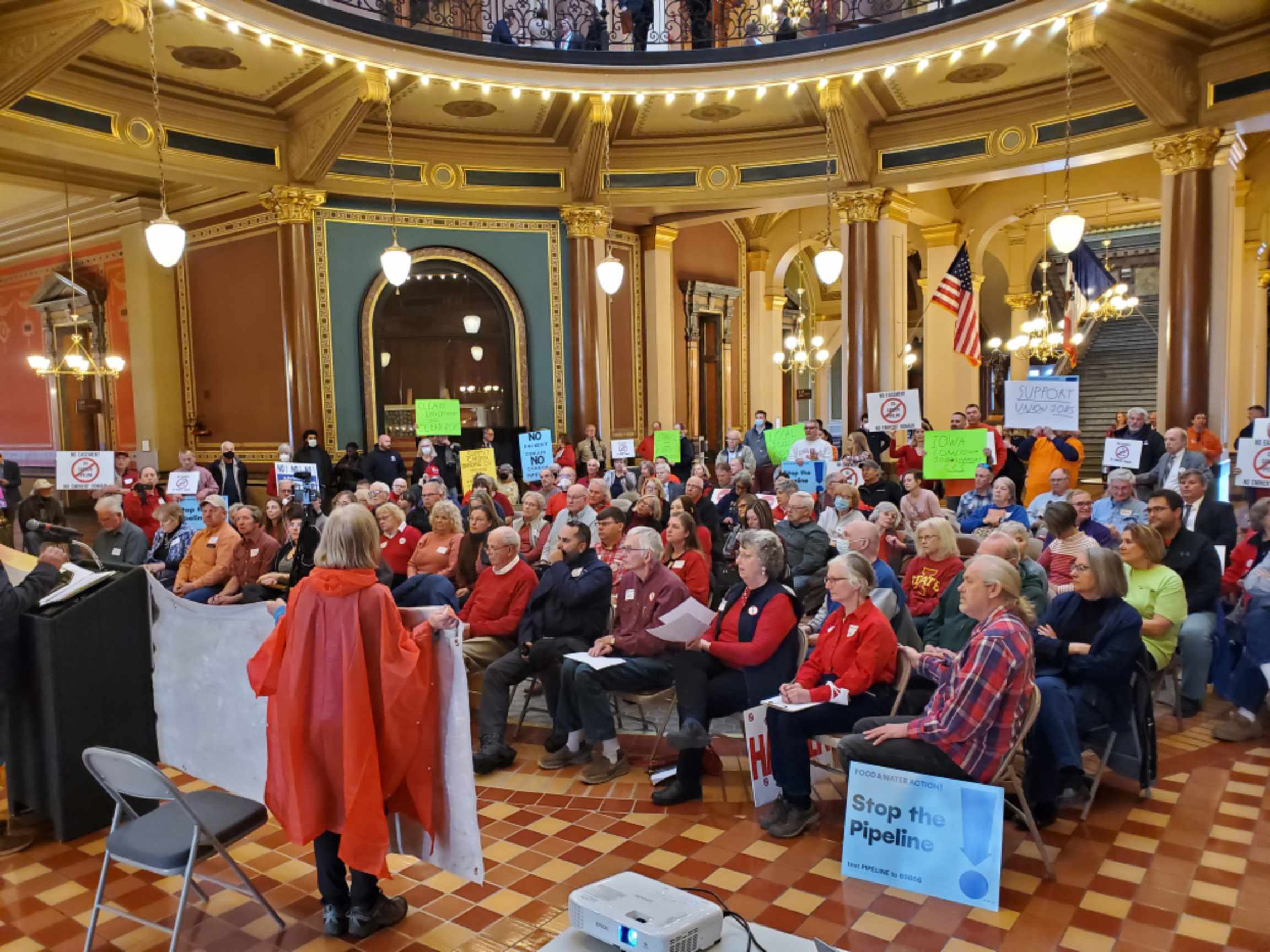
See our flyer on carbon dioxide pipelines
Reference: “Midwest Carbon Capture and Storage (CCS) Project Overview”, Wolf, ADM, April 2022
Photo with this article is from the People's Public Hearing at the Iowa Capitol on March 29. Landowners and environmentalists met with legislators and held a public hearing talking about the carbon dioxide pipelines and the need for legislation to protect the landowners from eminent domain for private gain.
Iowa Beyond Coal Joins Effort to Clean Up MidAm
Iowa Beyond Coal is proud to be a part of the new “Clean Up MidAm'' campaign. This new coalition of organizations and Iowans want to hold MidAmerican Energy accountable for its greenwashing and lack of climate goals. While publicly touting a 100% renewable energy vision, the monopoly utility is operating one of the largest coal fleets in the country with no plans to retire. This power generated from these coal plants is not needed to meet Iowa customers’ energy needs, and continues to be run at the expense of Iowans. 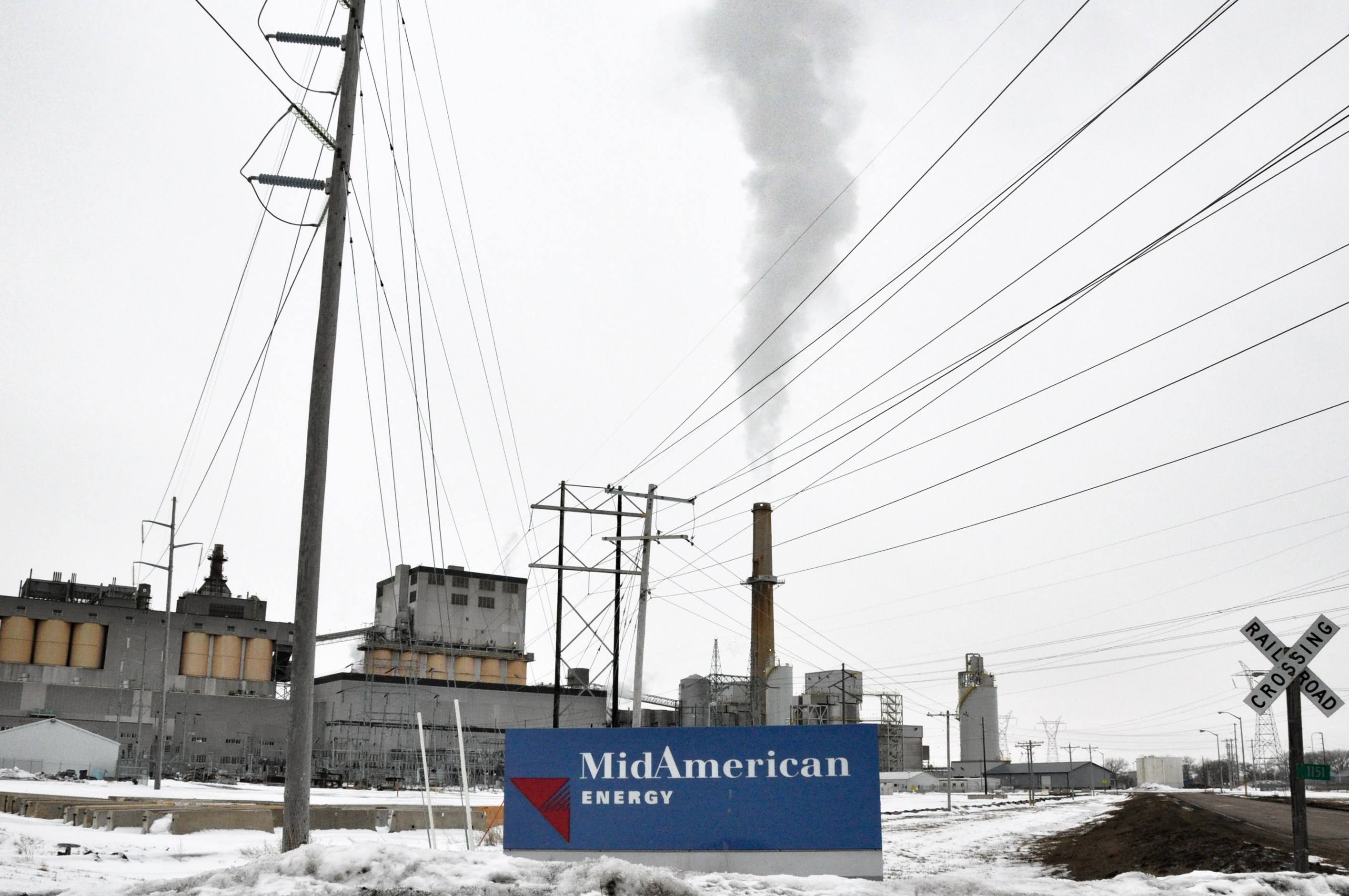
MidAmerican is the single largest carbon polluter in Iowa. Not only is the coal being burned in Iowa hurting the health and wellbeing of Iowans, it’s hurting our pocketbooks. A report filed at the Iowa Utilities Board showed Iowa ratepayers are forced to pay $1.2 billion to keep MidAm’s coal plants running.
We cannot wait any longer for action. Visit www.cleanupmidam.com to join the coalition today and demand that MidAmerican Energy make a real plan to close coal by 2030.
Report from the Iowa Labor and Climate Justice Summit
Members of the labor and environmental community met on April 9 to discuss areas where the two groups can work together to ensure that we can protect the climate and provide good jobs at the same time.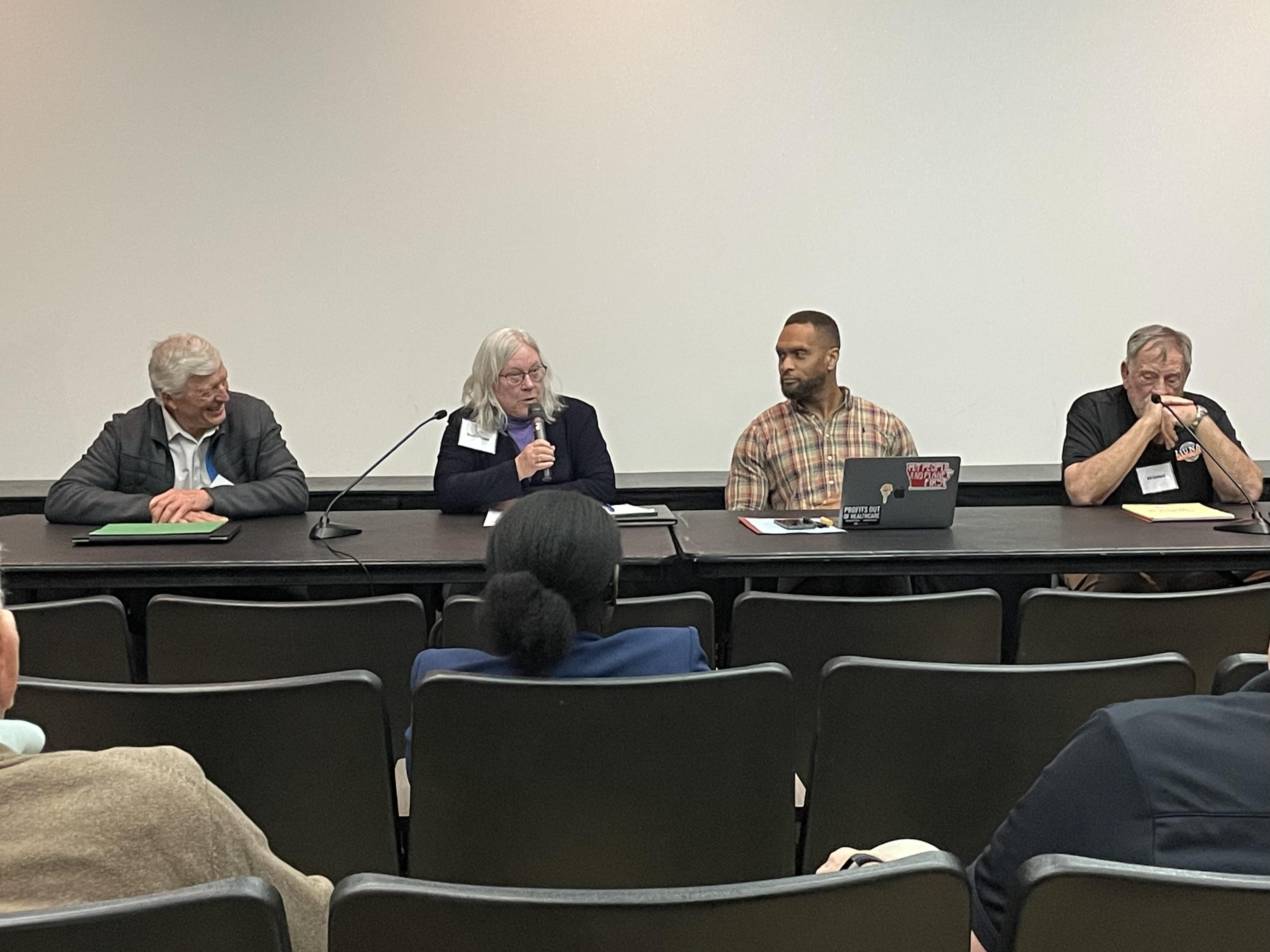
Pam Mackey Taylor, Director of the Iowa Chapter of the Sierra Club, and Katie Rock, Iowa Beyond Coal Campaign Representative for the Sierra Club, were guest speakers. Katie’s presentation was about "The Future of Utility-Scale Solar". Pam was part of a panel discussion about "The Struggle for Good Jobs and Utility-Scale Solar in Linn County". Pam’s presentation covered the recent zoning request made by Clenera for its Coggon Solar project.
The Coggon Solar project is a 750-acre 100-megawatt solar farm that will be built near Coggon, Iowa. The solar power will be sold to Central Iowa Power Cooperative (CIPCO) via a 25-year power purchase agreement.
The Coggon Solar project originally was not going to involve union labor. In a previous project in Wapello County, Clenera’s project was riddled with such dangerous conditions that its non-union workers walked off the jobsite.
When environmentalists dug into the details of the Coggon Solar project, they became concerned about some of the greenwashing that was laid out by Clenera. Just as they were cutting corners on labor issues, they were also cutting corners on environmental issues, relationships with the neighbors, and relationships with the community around the solar farm.
With that as a backdrop, union members engaged with the environmental community to seek an agreement with Clenera that they would use union labor for the Coggon Solar Project, which includes trained worked, paid a living wage, and workers who respect safety standards on the job site.
In the end, the labor community received a signed contract that union labor will build the Coggon Solar project and the environmental community was able to get a number of improvements:
- Increased set-backs from neighbors
- Increased vegetative screening, protecting the views of neighbors
- Increased the money put into the decommissioning fund, to help pay for the removal of the solar panels once the solar farm is removed from the landscape
Unfortunately, the environmental community did not get everything we supported – such as higher panels which would allow a slightly more diverse selection of prairie plants underneath the solar panels and which would improve soil health.
Without a doubt, it was difficult to see the neighboring landowners so opposed to the project. Unfortunately there was a lot of misinformation floating around about solar and problems with solar. We need to do a better job pitching the values and benefits of solar.
What this project did show is that it takes a huge effort to move a project into a more acceptable project – for labor and the environment. The Linn County planning department and Board of Supervisors were willing to take the time to listen to the public and all of our concerns. It takes all of us to speak out, to show up, and to work together. Democracy does work.
This experience also shows that with 21st century projects, labor and environmentalists can work together. As Katie Rock indicated in her presentation, the future is bright for utility-scale solar in Iowa.
Photo with this article is the panel discussing "The Struggle for Good Jobs and Utility-Scale Solar in Linn County" - John Zakrasak who is the Director of Linn Clean Energy District, Pam Mackey Taylor who is the Director of the Iowa Chapter of the Sierra Club, Stacey Walker who is a member of the Linn County Board of Supervisors, Bill Gerhard who is the Business Development Coordinator for Iowa Laborers-Employers Cooperation and Education Trust.
Legislation waiting for the governor's review
A number of pieces of legislation have moved to the governor's office. The governor can sign the bills or veto them.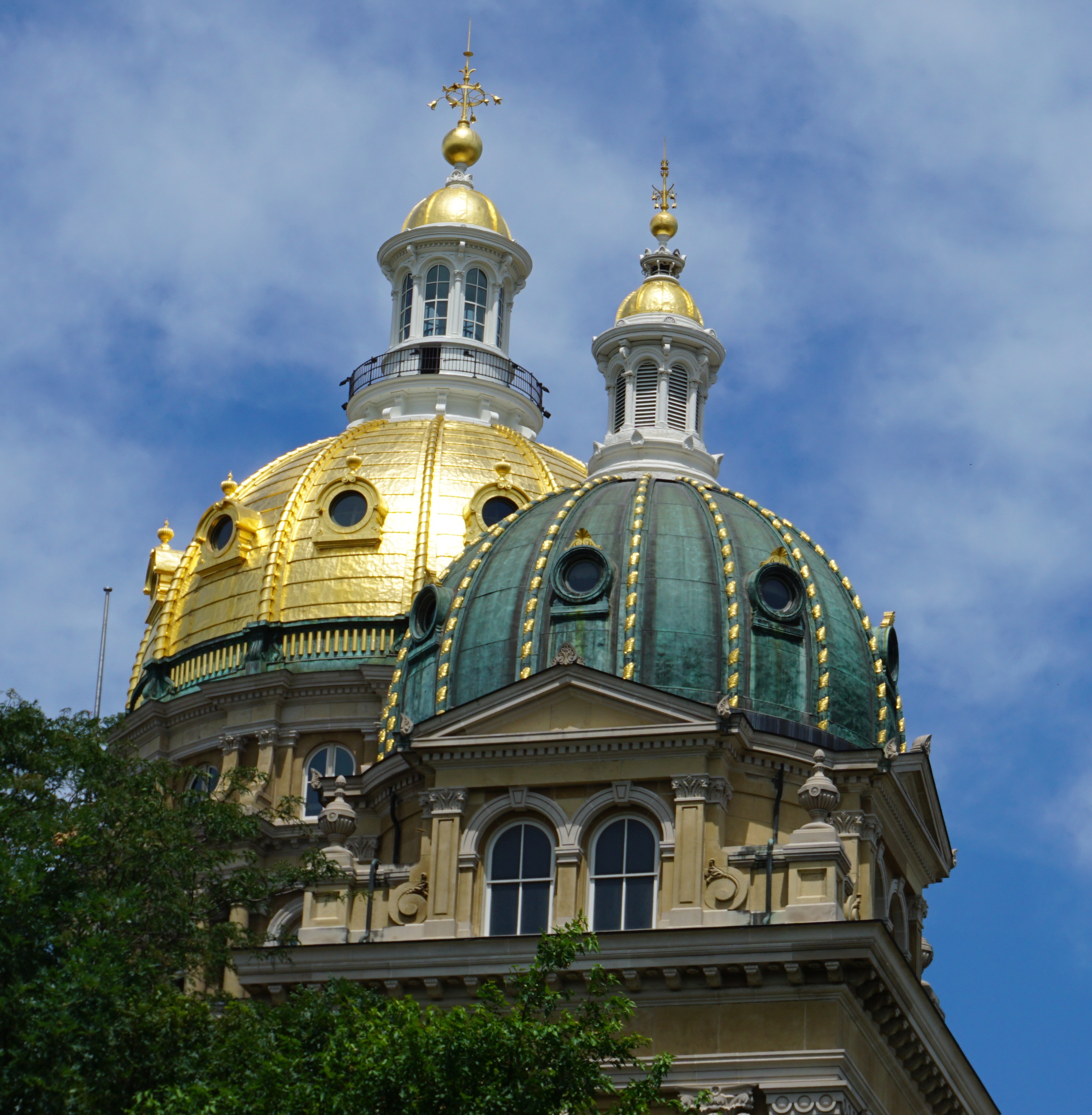
HF2412 - radon testing in public schools. The Iowa legislature passed a bill that would require testing for radon in public schools every 5 years. If the radon levels are high, the school would need to undertake radon abatement steps. Indoor radon is the leading cause of environmental lung cancer in Iowa. Radon gas is released when uranium breaks down. Uranium is a natural chemical found in Iowa’s soils and rocks. Outdoor levels of radon are low. However, radon levels can build up inside a building. Radon is an odorless, tasteless, and colorless gas. The only way you know if you have high levels of radon is to test for it. Given the high levels of radon found within the state, it only makes sense to have a program of testing schools for radon levels and then initiating methods to reduce radon levels if they are high. Furthermore, it makes sense to repeat the tests every 5 years, just to make sure that radon levels remain safe. Building radon abatement systems in new school buildings also makes sense. Ask the governor to sign HF2412 via her E-Mail.
SF2322 - reasonable costs for public records. SF2322 would curb the excessive fees members of the public have been forced to pay for those records. In fact, members of the public, the media, and the Sierra Club have had to abandon requests when the quoted fees have been too large. This legislation also limits charging for legal services for the redaction or review of public records. Currently the fees for redaction and review can been so excessive that private citizens cannot afford to view public records; that is not right. The cost for copying the records should be reasonable, not excessive and not at a profit to the agency. Tell Governor Kim Reynolds that you want her to sign the open records bill SF2322 via her E-Mail
Contacting the governor
- You can contact Governor Reynolds via her E-Mail Note: To electronically send a letter to the governor, you must use the governor's E-Mail system on her website.
- Or phone her office at 515-281-5211.
Update on bills signed by the Governor
The governor signed HF2380 - increasing the acres for growing hemp. HF2380 increases the number of acres of hemp a person can raise from 40 acres to 320 acres. Hemp is an alternative crop to corn and soy. Hemp can be used for animal feed and can be used in manufacturing products such as paper, textiles, insulation, and biodegradable plastics. But in order to build a thriving industry in Iowa that uses hemp, more acres of hemp need to be grown. That is why the legislature passed HF2380. The Sierra Club supported this bill.
The governor signed HF2481 - Appeals Court judge selection. The purpose of the judicial nominating commission is to review the candidates for the appeals court judges and then submit names to the governor, who will make a selection. This law increases the number of candidates sent to the governor from 3 to 5. This legislation is not necessary. It weakens the function of the nominating commission. This system has been a fair, merit-based process for appointing judges since 1966. It is obvious that the Republican legislators want to manipulate the process so they can attempt to get more judges with whom they agree with politically and philosophically. The Sierra Club cares about the selection of judges since we bring cases to the courts; we want to ensure that we can have a fair hearing of our environmental issues once we enter the courthouse. The Sierra Club oppposed this bill.
Ask legislators to keep the bottle deposit law working for all Iowans
Since its inception in 1978, Iowans have benefitted from the bottle deposit law. We are all familiar with paying a nickel deposit on plastic, glass, and metal pop and alcohol containers which is returned to us when we bring the empty bottles back to the store.
Both the Iowa House and Senate have advanced bills that would significantly alter the bottle deposit law, making it less convenient for consumers to redeem their empty bottles and cans. Among the changes are allowing the grocery stores, convenience stores, and other stores that sell pop, beer, and alcohol to refuse to redeem the empty cans and bottles. They are also increasing the distance between stores and redemption centers that will redeem the empty containers from 10 minutes to 10 miles or 15 miles. This will result in fewer places to redeem cans and bottles. All of this makes it less convenient to redeem your empty containers.
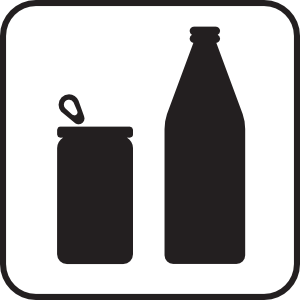
Tell your legislators that you want to keep the bottle deposit law working for all Iowans.
To find your legislators, see www.legis.iowa.gov/legislators/find
To look up your house member, see www.legis.iowa.gov/legislators/house
To look up your senate member, see www.legis.iowa.gov/legislators/senate
- Customers should be able to get their nickel deposits back when they return their empty containers
- The handling fee should be increased from 1 cent to 2 cents or more so redemption centers can remain open and can pay their workers a living wage.
- The allowed distance between stores and redemption centers should remain at 10-minutes or less. There are efforts underway to increase this to 15 or 20 miles, which will make it increasingly more difficult to return the empties.
- Keeping empty container redemption in the grocery stores and convenience stores.
- The Department of Natural Resources should be given the ability and authority to enforce the law if stores refuse to redeem empty containers and there is no redemption center 10 minutes away from the store
The Bottle Deposit Law is Popular. In fact, Iowans support expanding the bottle deposit law to include other beverage containers. The bottle deposit law diverts containers from the landfill and into recycled products. And the recycled bottles and cans provide a clean well-sorted valuable product. Further by encouraging recycling, less litter is strewn across the state. The bottle deposit law even provides spending money to those who collect discarded bottles and cans. The bottle deposit law provides jobs to Iowans who are involved in the recovery process. Iowa’s bottle deposit law has been a success.
UPDATE – PFAS contamination closes Central City well
Environmentalists have become increasingly concerned about a class of chemicals called perfluoroalkyl and polyfluoroalkyl substances, often abbreviated to PFAS. There are thousands of compounds, estimated over 5000, in the PFAS class. PFAS persists in the environment and does not break down. These substances are difficult to dispose of. That is why they are called “forever chemicals”. The compounds are linked to cancer, liver damage, and abnormal childhood development.
In February the Iowa Department of Natural Resources (DNR) reported test results showed elevated levels of PFAS in one well used by Central City, a town in Linn County. Further testing in March confirmed the earlier test results. Although the levels still fell with limits that were below the federal safety guideline for drinking water, the city decided that it would cease using that well to provide drinking water. The plan is to use the well for extinguishing fires or for backup should the city’s other well fail.[1]
In addition to ceasing use of the contaminated well, city officials flushed the water through its hydrants to remove high levels from the finished water system. Officials also indicated that they are going to be testing the water supply every three months for the presence of PFAS.
The Central City finished water tests showed 61 part per trillion which were relatively close to the federal safety guideline which is a limit of 70 parts per trillion. DNR looked into reasons for the higher levels, finding that the city's well is within a mile where a fire occurred at Iowa Gold Distributing. It is believed firefighting foams containing PFAS chemicals were used to extinguish the fire. A train derailment near that area may have contributed to PFAS contamination. The DNR also suspects that a manufacturing plant may have contributed to the PFAS.[2] DNR is going to continue tests to determine the source of the PFAS contamination.
The Iowa Department of Natural Resources is testing public drinking water sources and finished water to determining if there is PFAS contamination. DNR is reporting PFAS testing results on their webpage. The DNR is updating their webpage as testing is completed.
See our presentation "PFAS - "forever chemicals" are a serious environmental concern"
Footnotes
[1] Jared Strong, "Central City stops using drinking well that is tainted by ‘forever chemicals’ ", Cedar Rapids Gazette, March 30, 2022
[2] Jared Strong, "Central City water has 'forever chemicals' near threshold", Cedar Rapids Gazette, March 14, 2022
and Marissa Payne, "'Very low' levels of forever chemicals found in C.R. water", Cedar Rapids Gazette, March 15, 2022
Join us for interesting and informative webinars
Lunch and Learns
Every Friday at noon, we do a Lunch and Learn livestream. See us on Facebook at "Sierra Club Iowa Chapter". These will be recorded so you can watch them anytime. Topics will be selected based on what is happening during the week and will be announced the day before the livestream. During the legislative session, we cover issues coming before the Iowa legislature.
In case you missed our past webinars and lunch and learn sessions, you can still see them.
Volunteer for the Iowa Chapter
Almost everything we do is done by volunteers like you. If you would like to volunteer for the Iowa Chapter, please let us know by sending an E-mail to Iowa.chapter@sierraclub.org. Or sign up by using the online form. There are many opportunities for you to make a difference:
-
making phone calls
-
developing graphics for banners and flyers
-
working on legislative issues
-
working on elections
-
fundraising
-
organizing events
-
joining an issue committee
If you would like to join a committee on the Peoples Budget, sign up here please fill out our People's Budget Volunteer Form so we can build our organizing team for this project. A large number of Sierra Club issues require some involvement with Iowa's state budget. Budgets reflect theories of government. Iowa’s political conversation rarely moves beyond the notion that government’s primary responsibility is to grow the economy. Hence we give corporations tax breaks, but slash funding for health care, environmental protections and public interest research at our three state universities. We hold a different view of government and that is government is the trustee of all the things we share - public roads and bridges, water, wildlife, air, public universities, state parks, education and public health. Therefore, protecting, enhancing and restoring our shared public wealth is the central responsibility of government. We must tie the budget to our priorities.
If you would like to join our legislative action team, sign up here. Keep on top of what is happening at the Iowa legislature. Be alerted when you should contact your legislators about pending legislation.
Contribute to the Iowa Chapter
Sierra Club - the best bet for achieving bold solutions to Iowa’s environmental problems
Sierra Club is Iowa’s oldest and largest grassroots environmental organization. Not only that, we are the best bet in the state for achieving bold solutions to Iowa’s environmental problems.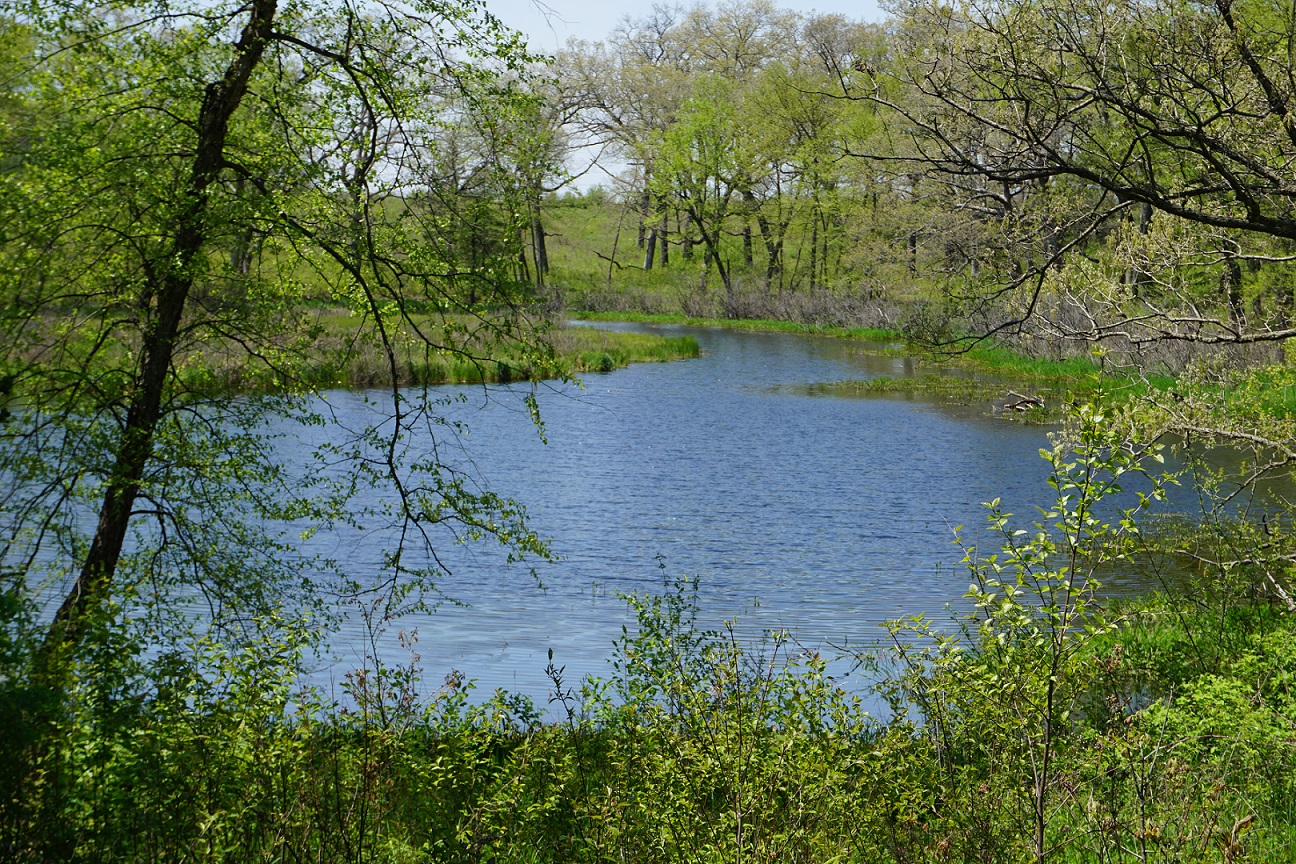
We work in the courts, before Iowa’s public agencies, and in the halls of the legislature. The Iowa Chapter's effort to protect the environment takes financial support. The Chapter receives very little financial support from the national Sierra Club. Can we count on you for a donation to ensure even more victories? Your contribution will be put to work here in Iowa on issues that affect every day Iowans – water quality, clean air, protection of Iowa's soil, parks and natural areas, and a strong democracy. The Iowa Chapter is relentless in fighting back bad legislation that affects every one of us.
Your non-deductible contributions make it possible for us to fight bad legislation and to promote good legislation. We appreciate your past and on-going support of these efforts. You can make a non-deductible donation with a credit card. A non-deductible donation supports the Chapter's effective, citizen-based advocacy and lobbying programs. If you prefer, a non-deductible check can be written to the Sierra Club Iowa Chapter and mailed to:
Treasurer
Sierra Club, Iowa Chapter
PO Box 1058
Marion, IA 52302
You can also make a tax-deductible donation with a credit card. Tax-deductible activities are limited to public interest education, research and legal actions. A deductible check can be written to the Sierra Club Foundation with “Iowa Chapter” written in the memo line.
Thank you for your support.
Donate your used vehicle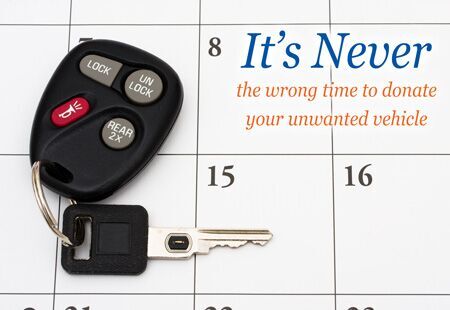
As the Sierra Club Foundation's Iowa Chapter continues to raise charitable funds to support its work in Iowa, won’t you consider participating in our vehicle donation program? Our partners over at CARS have made the process of donating your unused or unneeded car, truck, motorcycle, boat or RV easy, efficient and secure. They’ll take care of everything from picking up your vehicle to sending you a tax receipt for your generous gift. To learn more about The Sierra Club Foundation's Iowa Chapter vehicle donation program, please call 844-674-3772. Or visit our webpage to get started today!
Sierra Club Foundation promotes climate solutions, conservation, and movement building through a powerful combination of strategic philanthropy and grassroots advocacy. The Foundation is the fiscal sponsor of Sierra Club’s charitable environmental programs.
For more information
Planned giving . . . naming the Sierra Club Iowa Chapter in your will
Ensure your environmental legacy by naming the Iowa Chapter in your will or trust. These gifts cost you nothing now. You can hold onto your assets for as long as you need them.

Thank you for supporting our work!
| When | Earliest: Latest: |
| What |
|
| Word or Phrase | Word or phrase to search for: |
| Leader | All or part of leader name to search for: |
No Matching Activities Found
Loading
| Date | Activity (click title for full description) | Sponsor | Category | Type | Difficulty | Links |
|---|
Loading ...
 Outing
Outing Club support event
Club support event  Social event
Social event  Activist event
Activist event  Multiple events (map only)
Multiple events (map only)